Understanding the Cost of Owning a Parrot: A Comprehensive Guide
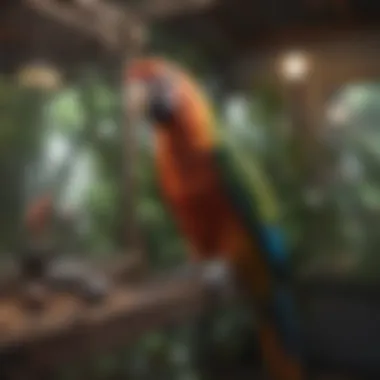

Intro
Owning a parrot is not just an emotional investment; it also requires significant financial considerations. Beyond the appeal of these colorful, intelligent creatures lies a broad spectrum of costs, including initial purchases and ongoing expenses related to their care. This article seeks to give prospective parrot owners insight into what it really takes to responsibly manage these wonderful companions.
Understanding both the one-time and recurring costs of parrot ownership is vitally important. Individuals must be prepared for various types of expenditures, from the cost of high-quality cages to specialized food. By providing a comprehensive analysis of what it means to own a parrot, the discussion below aims to help you make informed choices that enhance both your quality of life and that of your avian friend.
Care Tips
Parrots require attentive daily care to thrive in a home environment. Establishing a routine not only facilitates the emotional and physical health of the bird but also improves the bond between the owner and the pet.
Daily Care Routines
Every parrot species has specific needs, but some general routines apply across the board. Daily, a parrot should be fed a balanced diet, offered fresh water, and provided opportunities for social interaction. Routine activity is critical.
Cage Setup and Maintenance
The cage must provide adequate space, safety, and enrichment for the bird. A quality cage often demands upfront costs but leads to savings in maintenance over time. Careful daily cleaning decreases illness risks. Invest in sturdy materials to ensure longevity.
Hygiene and Cleaning Practices
Maintaining hygiene is non-negotiable. This includes regular cleaning of the cage, as well as disinfecting feeding dishes and water supplies to prevent bacteria growth. Incorporate replacing shred materials and other items often used by your parrot.
Seasonal Care Adjustments
Seasons may demand changes in care routines. For instance, additional moisture in winter helps prevent dryness. Higher temperatures in warmer months confirm the bird stays hydrated amid heat.
Behavioral Insights
Recognizing and addressing behavioral cues requires keen observation. Understanding bird body language can lead to a more harmonious environment.
Understanding Bird Body Language
A parrot's body language often expresses emotions or dislikes. For example, ruffling feathers might signify agitation. Learning these signs promotes better care.
Common Behavioral Issues and Solutions
Behavioral challenges, such as excessive screeching or feather plucking, are common. Identify causes these problems early, and provide effective solutions like altering environment or increasing interaction.
Positive Reinforcement Techniques
Implementing positive reinforcement aids training and reduces stress for the bird. Methods may include praise or treats following desirable behaviors, enhancing your relationship with the parrot over time.
Social Interaction Needs
Parrots are social creatures. Given both mental and physical stimulation requires engaging them on multiple levels. Plan structured interactions and even supervised playdates with other birds when possible.
Nutrition Guides
Proper nutrition extends beyond mere feeding. Create a balanced diet that meets all essential components for your parrot. This discussion highlights its specifics further below.
Essential Diet Components
Primarily, seeds may not fulfull their nutritional requirments. Offer pellets along with fresh fruits and vegetables for increased vitamins.
Safe and Toxic Foods
Being aware of toxic items is crucial. For example, avoid feeding avocados, chocolate, and caffeine, as certain foods can lead to serious health casualties. Always check reliable resources when introducing new foods.
Supplements and Treats
Occasionally, you may need to supplement your bird's diet. Calcium blocks, for instance, promote bone health, while seeds can serve as a treat.
Feeding Strategies for Different Species
Different species of parrots have unique dietary requirements. Budgies may require only minor cleanup during meals compared to larger Macaws. Knowing species-specific requirements is essential.
Wellness and Health
Maintaining the health of your parrot is both preventive and reactive. \nRegular wellness checkups play major role in sustainable ownership.
Routine Health Checkups
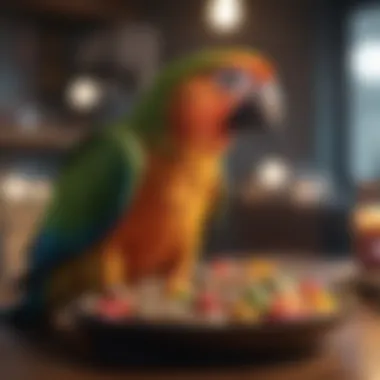
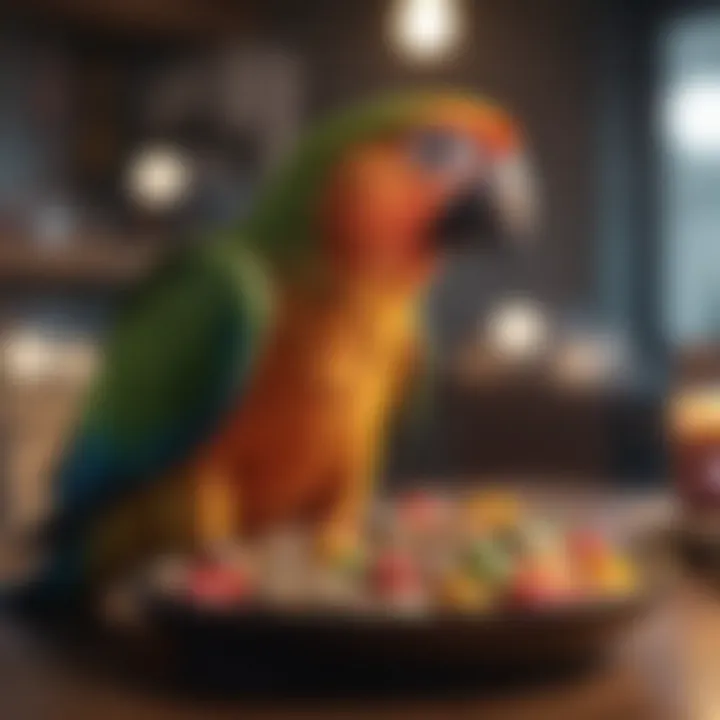
Much like humans, parrots should visit a veterinarian regularly. Defining schedules for checkups aids symptom spotting and remedying possible illnesses. Establish choices for avian biopathology who are specific to parakeets.
Identifying Symptoms of Illness
Reading your bird's behavior can reveal health issues. Seek your vet promptly for signs like fluffed feathers, lethargy, or rapid breathing.
Preventative Care and Vaccinations
Preventative care reduces risk for several illnesses. Vaccination may also be necessary based on your parrot’s species and habitat. Follow every medical guidance relevant for tailored actions.
Mental and Emotional Well-being
Remember that emotional well-being is equally essential. To tackle stress, offer stimulating engagement through social networking or environmental changes designed to reduce boredom.
Enriching Activities
Providing a variety of stimulating activities ensures the bird's mental health is well-guarded. Good practices will benefit your lifestyle as much as it does theirs.
Toys and Playtime Ideas
Purchase high-quality bird toys from esteemed brands to promote tactile stimulation. Changing up toys often avoids boredom.
Training and Tricks
Like any pet, consistent training sessions serve to boost relationships. A parrot can learn various commands or even perform entertaining tricks with patience.
Outdoor Activities and Interaction
Experiencing outdoor surroundings can enhance vitality. Indoors, or confined homes often require supervised opportunities that can still provide vital social aspects.
DIY Projects for Mental Stimulation
Finally, creating DIY projects enables your parrot to use its natural behaviors and instincts. Simple structures using paper, cardboard, or swings can serve dual purposes as boredom busters.
Understanding both the emotional and financial commitments to parrot ownership will enrich not just your life, but also the life of the companion who entrusts you with their care. Empowering yourself with proper knowledge transforms this journey into one of mutual joy.
Prolusion to Parrot Ownership
Owning a parrot as a pet can be a fulfilling experience. As potential bird owners, understanding the intricacies of parrot ownership is crucial. This serves not only to prepare financially but also to understand the responsibilities of caring for such intelligent companions. The complexity of care and commitment involved becomes evident when one begins to consider various aspects of parrot life.
The Appeal of Parrots
Parrots captivated many with their vivid colors and playful behavior. They are unique creatures, displaying abilities to mimic sounds and even speech. Their social nature allows deep bonds between birds and their owners. For animal lovers, parrot ownership can become more than just a hobby; it can evolve into a meaningful partnership. However, become well-informed about what ownership entails before considering bringing one into the home. The investment is not only for purchasing the bird but also for their lifelong care.
Commitment to Care
Caring for a parrot requires immense dedication. These birds can live for many decades, with some species reaching over fifty years. This longevity means a long-term commitment, both emotionally and financially. Daily tasks must be addressed that include providing nutritious food, a spacious habitat, and mental stimulation through toys and social interaction. Some owners may underestimate the intensity of this responsibility. Making informed choices upfront will lead to better outcomes for parrots and their owners in the long run. Therefore, prospective parrot owners should consider this commitment seriously before deciding to bring a feathered friend into their lives.
Initial Costs of Acquiring a Parrot
Understanding the initial costs associated with acquiring a parrot is crucial for potential bird owners. This section lays the groundwork for being aware of financial implications beyond just the price of the bird itself. Considering these costs beforehand enables prospective owners to budget effectively and set realistic expectations, ensuring a successful avian companionship.
Purchasing a Parrot
Factors Influencing Price
Several factors impact the price of a parrot, a key aspect to consider before bringing one home. First, the species can determine the overall cost. Popular species like parakeets are generally more affordable than larger types, such as macaws or african greys. Additionally, the age and lineage of the bird can play a significant role. Younger birds may carry a higher price tag, while adult parrots may be less expensive but could require considerably more attention in terms of adaption.
The seller's reputation is also essential. Renowned breeders or reputable pet stores often have higher prices but usually ensure the health and proper breeding of the birds. Opting for birds from a distinguished source is wise, though it might strain your budget.
Price Range for Different Species
When contemplating the price range for various parrot species, it is beneficial to outline key details. Small species like budgerigars range from about $15 to $150, providing an accessible entry point for novice owners. Medium-sized birds, like cockatiels, can cost between $50 to $250. For more exotic and larger species, the prices can escalate rapidly. The cost of a young hyacinth macaw, for instance, can reach up to $20,000. This tangible range highlights the diversity present in parrot ownership and assists potential owners in aligning their finances with their preferences.
Essential Equipment and Habitat Setup
Cages: Types and Costs
Caging is a critical component for maintaining the safety and happiness of a parrot. Many different types of cages are available, varying greatly in materials, sizes, and prices. The most common are metal and plastic cages, both offering safety but catering to different needs. Metal cages generally provide durability, which is necessary, especially for larger or more aggressive species.
On average, cages can range from $50 for economical models to $500 or more for large, elaborate setups designed to accommodate specific species. Careful regard to initial cage costs ensures an invaluable investment in the bird's well-being.
Accessories and Enrichment Items
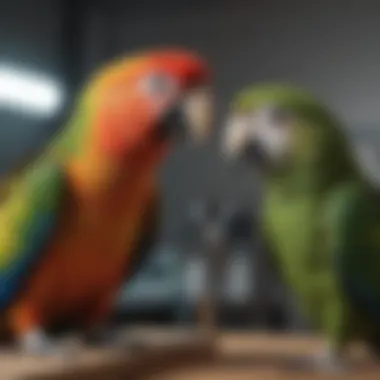
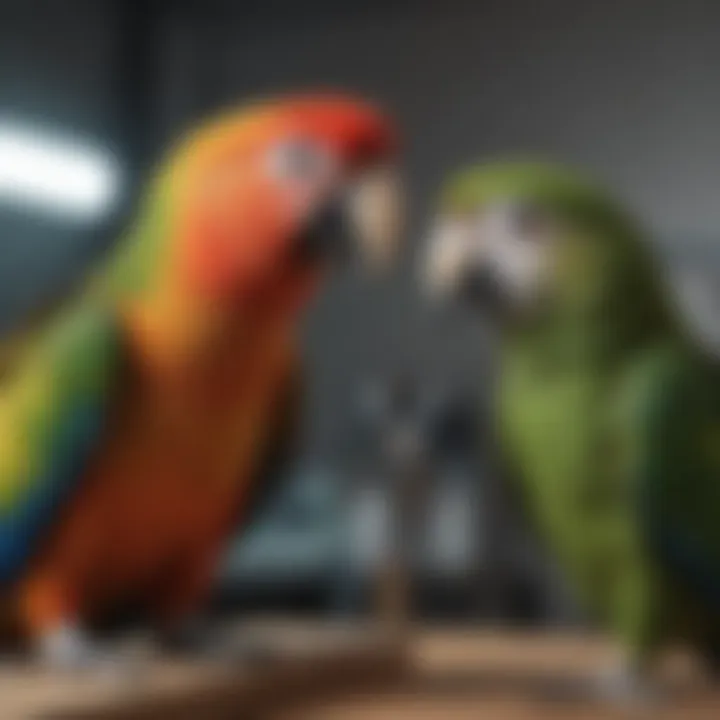
To foster a stimulating environment, numerous accessories and enrichment items are needed. When selecting toys, swings, and perches, quality is vital. Parrots tend to destroy lower-grade items quickly, leading to more frequent replacements. Budgeting for these accessories typically amounts to an initial investment of $100 to $300, depending on the number and complexity of items. First prices may fluctuate based on brands, but consider them to keep the birds healthy and engaged.
Initial Health Check Costs
Investing in an initial health check for a new parrot is a logical step. This ensures the bird’s health status that may not be immediately evident. Avian veterinarians often offer checks around $50 to $150, covering necessary tests such as blood work and examinations. Knowing that your bird is healthy provides peace of mind and highlights the importance of budgeting for initial healthcare as part of the acquisition process.
Ongoing Expenses of Parrot Ownership
Owning a parrot comes with various ongoing expenses. Understanding these costs is crucial for anyone looking to provide a suitable environment for their avian companion. These expenses contribute significantly to the wellbeing of the bird and reflect the commitment of the owner. Key expense categories include daily nutrition, health care, and equipment maintenance, each with its own unique attributes and financial requirements.
Daily Nutrition and Diet
Types of Food and Their Costs
Feeding a parrot comprises means more than just scattering seeds. Different bird species require tailored diets, including pellets, fruits, and vegetables. The cost of food can vary widely depending on the type and quality selected. High-quality pellets designed for specific species may range from $15 to $50 per bag, and this could last a month or longer, depending on the parrot's size and appetite.
- Not all foods have the same nutritional value; some are designed to meet specific dietary needs of parrots. A premium brand, for example, may provide better overall health support compared to economy brands.
Owning a parrot means more persistent shopping than anticipated. Almost all parrot diets should incorporate fresh veggies and fruits. These incur continuous costs as fresh produce needs to be bought regularly. Finding a balance between health and savings is essential.
Importance of Fresh Produce
Fresh produce should never be neglected when it comes to a parrot's diet. Incorporating fruits and vegetables into a bird's meals is essential for optimal health and digestion. Fresh produce outputs many vitamins. Something like carrots, greens, and apples suit feathered companions. The prices vary based on season and availability.
- Consuming fresh items boosts well being compared to dry food, leading to vibrant plumage and increased energy levels.
An area for cost-consideration in fresh produce is the possibility of wastage. Not all parrots enjoy every type of vegetable; thus, careful menu planning is required to nourish the mate’s health while minimizing food waste.
Regular Health Care and Veterinary Visits
Regular health care includes consistent veterinary check-ups that help in early detection of subtle health issues. Vaccination and check-up sessions can manifest into costs, so an appropriate budget must be created.
Vaccinations and Check-ups
Annual check-ups are necessary, alongside any needed vaccinations. Standard vet visits costs, however, top $50 to $100 without considering medication if something arises. These costs include general observaiones and recommendations on lifespan. Certain parrot species may have different needs, potentially leading to annual expenses exceeding $200.
- Keeping up with vaccines reduces vulnerability to common diseases like psittacosis. Therefore evasive actions during vulnerability of their species prolong health and nurturing.
Spending this money comes with unseen larger outcome - a healthier bird with quality experiences extends life expectancy for birds over their lifetimes. Small checks promote postures of regular recovery.
Emergencies and Unexpected Costs
Unexpected occurrences like injury, or drops in health status can entail considerable expense. Veterinary emergencies typically jump-start costs between $100 and several thousand for serious conditions. Having an emergency savings fund can save unease on critical days.
- Shackling pet ownership to feeling of indecisiveness can produce regret at needing urgent vet care.
Insurance should be another tool to consider. Options on avian veterinary care arrive with premiums, balancing choice and immediacy with overall health longevity for your feathered friend.
Equipment Maintenance and Replacement
Parrots possess natural tendencies to chew. Thus it must engage i playful or learning endeavours with its habitat. Toys and perches require consideration
Replacement of Perches and Toys
Every bird quietly leaves wear marks on perches, along with social tools maintained only for a few months. Owners may anticipate costs ranging from $10 to $50 every few months depending on selection. Higher-quality options made from durable materials ultimately preserve health without perpetuating injuries connected regularly to a stubbed auto crate option.
- Good toys stimulate exercise, so incorporate options encouraging psychology.
The varied specifications empowered improvements with proposition impacts bids before making arbitrary purchases.. Catch differing focuses, knowing required per commonly veiled coarse-perch width embellishments could comfortably deter replace costs later.
Cleaning Supplies and Costs
Owning a pet parrot is mmore than feeding and watching the bird. Regular cleanings ensures harvesting gather remains energetically enough. It requires maintaining closet supplies—budroon, supplements whims understanding place meant lively companions impressed. Cleaning solutions and refilling consumables ensure hygiene routes exist.
- Purchase-friendly detergent originates cleanup solutions that devoid chemicals humans not doubtless bonded belief atop vaencing preparing crumb portions dropped off.
Money spent in this area aims towards living comfort. Assuming defined practices well trained can extend leading anywhere between $10 easily devoted monthly through segregating patterns.
Comparing Costs Across Different Parrot Species
When deciding to bring a parrot into your home, understanding the costs associated with different species is crucial. Each parrot has unique needs and requirements, which influence both their purchase price and day-to-day upkeep. By comparing costs, future parrot owners can make well-informed decisions that align with their budgets and lifestyle, ensuring they can provide proper care and a suitable living environment for their avian companion.
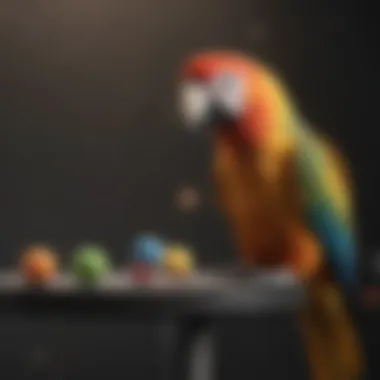
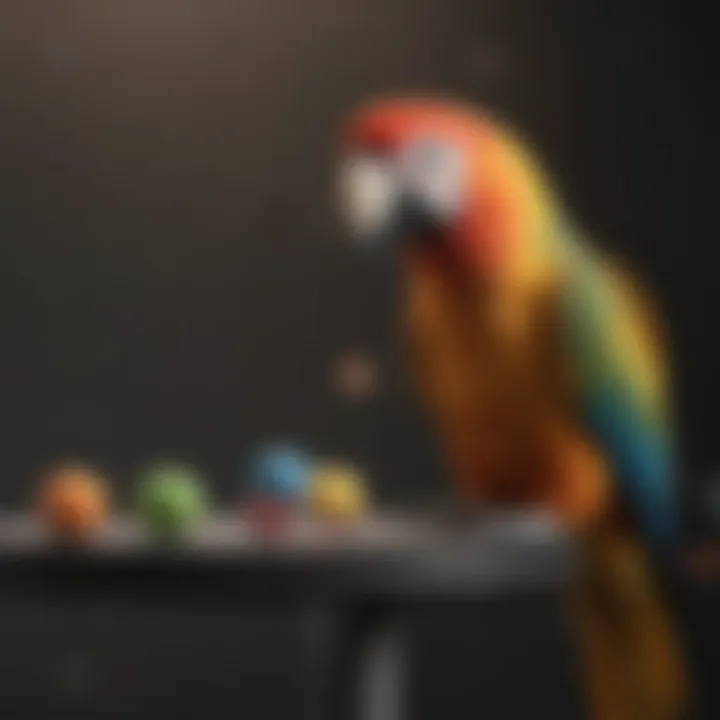
Commonly Kept Species: Budgerigars to Macaws
Among the parrot species commonly kept as pets, Budgerigars, also known as budgies, are some of the most affordable. Their price typically ranges from $10 to $50 based on color and breeder reputation. They are relatively low-maintenance, needing standard cages and sourcing basic seed diets.
Cockatiels are another popular choice, usually priced around $50 to $150. They require moderate space and fare well on a varied diet that includes seeds, pellets, and fresh fruits or veggies. Handling and interaction are vital for their social development.
African Grey parrots are more costly, ranging from $800 to $2,500. Their intelligence and need for mental stimulation result in higher ownership expenses. An African Grey owner will likely invest in plenty of toys and activities.
Macaws are at the top of the price range, often costing between $1,000 to over $3,000. Their cages, toys, and dietary needs significantly increase the upkeep expenses as well. These larger birds are known for their vocal abilities and require engaging interactions.
Considerations
- Size of species influences habitat control and needs.
- The potential for long lifespan refers to long-term care protocols.
- Social behaviors may determine the amount of interaction required or group dynamics.
Rare and Exotic Species
Owning rare and exotic parrot species adds a different layer of complexity. These birds often come at a premium price. For instance, a Hyacinth Macaw can cost anywhere from $8,000 to $15,000, not considering the extensive expenses related to habitat setup and specialty diet that may follow.
Another exotic option, the Spix’s Macaw, has a significant price tag, also reaching upwards to $10,000. Their availability is limited, and adopting from a reputable source becomes key. Often these birds have a stricter dietary and care regimen, meaning potential owners must prepare for specialized attention.
Important Aspects
- Ensure you follow local regulations around rare species ownership.
- Inquire about the lineage and health certifications to minimize risks at purchase.
- Budgeting for specialized care is more vital with different species.
Owning both commonly-kept and exotic parrot species can bring joy and companionship. However, costs vary significantly and should guide decisions for potential parrot enthusiasts. Balancing the initial purchase price with ongoing expenses is essential for sustainable pet ownership.
Cost-Saving Tips for Parrot Owners
Owning a parrot can be a delightful and fulfilling experience, but it can also be costly. It not only requires financial resources but also time and dedication. Therefore, being aware of how to save money on key expenses can significantly enhance one's journey as a parrot owner. In this section, various cost-saving strategies will be explored. By implementing these, you can mitigate some costs while ensuring your pet receives the best care.
Budgeting for Bird Care
Understanding your financial landscape is crucial when taking care of a parrot. While some may dismiss the need for strict budgeting, it plays an essential role in maintaining healthy and happy birds. Consider the key areas where expenditures come into play:
- Food: Charting out monthly expenses for high-quality bird food, fresh fruits, and vegetables can save you from impulse purchases.
- Housing: Know the upkeep involved in your parrot's habitat, such as cleaning and ensures;t that you are not overspending on unnecessary equipment.
- Health Care: Set aside a specific section for vet visits and potential emergency care. Unexpected costs can accrue quickly without a financial cushion.
Creating a meticulous budget also lends both peace of mind and improved decision-making skills. Ultimately, careful financial planning ensures you are not overspending. This empowers you to eventually enjoy the enriching experience of caring for a parrot more than if you were constantly worried about finances.
Buying in Bulk and Sharing Resources
The collaborative spirit among parrot owners can lend significant savings. Purchasing pet supplies in bulk often provides discounts, which can noticeably reduce overall spending. Key areas to focus on include:
- Food: Many species of parrots share similar dietary needs. Buying bird food in larger quantities can save money and ensure a consistent supply, negating the risk of running out unexpectedly.
- Cages and Accessories: If considering upgrading your parrot's home, collaborate with local bird-keeping communities to explore shared purchasing options. Pooling resources may result in lower costs.
Online platforms, especially community forums like the ones available on reddit.com or various Facebook groups, can be useful tools for finding local supply swaps or package deals, further enriching your inventory without breaking the bank.
DIY Solutions for Accessories
Making your own bird accessories not only can save money but also fosters creativity. Birds, especially species like African Greys and Amazons, need stimulation and varied environments. Many easily fabricated options include:
- Toys: Craft toys from household items such as unused kitchen utensils or recycled paper. Provide enrichment without splurging on store-bought items.
- Perches: Construct natural tree branches from outdoors. They often provide better grip and preferred choices for feathers to navigate.
Engagement in DIY projects also strengthens the bond between you and your bird. Occasional unsuccessful attempts are common, but adjusting your designs helps develop materials tailored for your parrot’s preferences.
Taking a proactive approach in budgeting, relying on teamwork with community members, and creating charismatic bird accessories not only proves that cost-saving measures can be productive but also ensures a positively rewarding parrot ownership experience.
Finale: Weighing the Costs Against the Benefits
In considering parrot ownership, it's essential to examine not only the financial aspects but also the inherent rewards. Acquiring a parrot involves significant expenses, many of which are ongoing. These can include high-quality food, regular vet visits, and proper layer for their habitat. Therefore, a realistic assessment is necessary.
Evaluating Long-Term Commitment
Owning a parrot is not a short-term endeavor; it requires long-term planning and dedication. A parrot can live for decades, depending on the species. New owners must think about their personal lifestyles and how a bird will fit into their routines.
Factors to consider include:
- Living Situation: Owners should evaluate whether they have ample space and if the environment is parrot-friendly. Parrots need both physical and mental stimulation.
- Time Investment: Parrots need daily interaction for emotional well-being. Not engaging with them can lead to behavioral issues.
- Longevity: Many parrot species have lifespans of 20 years or more. Prospective owners must be ready for this commitment.
For detailed examples, consider how a budgerigar may need different interaction compared to an African grey. Each type has specific needs that can vary based on your living arrangements and schedule.
The Reward of Avian Companionship
The companionship of a parrot provides numerous psychological and emotional benefits. While costs are unavoidable, the rewards can outweigh the financial burdens. Parrots are intelligent creatures and often form strong bonds with their owners, offering an enriching experience. Some points to remember include:
- Social Interaction: Parrots enjoy interaction, which contributes to their and their owner's happiness. Listening to them mimic voices and sounds can be delightful.
- Learning Experience: Each day can present new opportunities for both learning and creativity. By training a parrot and providing new stimuli, owners grow along with their pet.
- Stress Relief: The presence of a pet can reduce stress levels significantly. The right bond with a parrot can offer considerable comfort in tough times.
“One must remember, while costs are necessary, what price can you put on a loyal companion?”
Ultimately, while upfront and ongoing costs of owning a parrot must be weighed carefully, the rewards of companionship, happiness, and personal growth often make those fees a worthwhile part of your financial planning.















